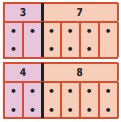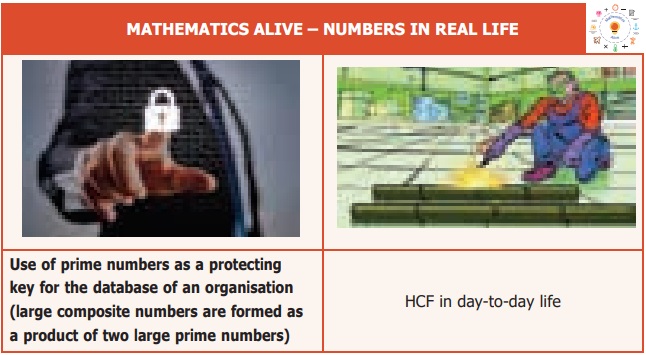Term 2 Chapter 1 | 6th Maths - Numbers | 6th Maths : Term 2 Unit 1 : Numbers
Chapter: 6th Maths : Term 2 Unit 1 : Numbers
Numbers
CHAPTER 1
NUMBERS
Learning Objectives
* To identify prime and composite numbers.
* To know the divisibility rules and use them to
find the factors of a number.
* To write a composite number as a product of prime
numbers.
* To find the HCF and the LCM of two or more numbers
and use them in real life situations.
Recap
1. Odd and Even Numbers
*
A number is called an odd number if it cannot be grouped equally
in twos. 1, 3, 5, 7, …, 73, 75, …, 2009,… are odd
numbers.
*
A number is called an even number if it can be grouped equally in
twos. 2, 4, 6, 8, ..., 68, 70, . . , 4592,... are even numbers.

*
All odd numbers end with anyone of the digits 1,
3, 5, 7 or 9.
*
All even numbers end with anyone of the digits 0,
2, 4, 6 or 8.
* In whole numbers, odd and even numbers come alternatively.
Try these
(i) Observe and complete:
1+3 = ?
5+11 = ?
21+47 = ?
........+....... = ?
1 + 3 = 4
5 + 11 = 16
21 + 47 = 68
33 + 51 = 84
From this observation, we conclude
that “the sum of any two odd numbers is always an even number”
(ii) Observe and complete:
5 × 3 = ?
7 × 9 = ?
11 × 13 = ?
.... × ..... = ?
5 × 3 = 15
7 × 9 = 63
11 × 13 = 143
23 × 15 = 345
From this observation, we conclude
that “the product of any two odd numbers is always an odd number”
Justify the following statements with
appropriate examples:
(iii) The sum of an odd and an even
number is always an odd number.
(iv) The product of an odd and an
even number is always an even number.
(v) The product of any three odd numbers
is always an odd number.
Note
* 1 is odd, its successor 2 is even
and so its predecessor 0 is also even.
* The first natural number 1 is odd
and the first whole number 0 is even.
2. Factors
Think about the situation:
The teacher gives Velavan two numbers 8 and 20 and
asks him to write them as a product of two numbers. Velavan, with his mental math
skills and also using the multiplication tables, quickly finds that 8 = 2 × 4; 20
= 2 × 10 and 4 × 5. From this, we can say that 2 and 4 are factors of 8 and also
2, 4, 5 and 10 are factors of 20. We can also write 8 as 1 × 8 and hence conclude
that 1 and 8 are also factors of 8.
From the above examples, we observe that,
* A factor is
a number that divides the given number exactly (gives remainder zero).
* Every number has two factors that is 1 and the
number itself.
* Every factor of a number is less than or equal
to that number.
3. Multiples
Look at the multiplication table of (say) 7:
1 × 7 = 7
2 × 7 = 14
3 × 7 = 21
4 × 7 = 28
5 × 7 = 35 ...
We say that the numbers 7, 14, 21, 28, 35,... are
multiples of 7.
From this, we observe that
* Every multiple
of a number is greater than or equal to that number.
Multiples of 7 are 7, 14, 21, 28,... . They are
greater than or equal to 7.
* Multiples of a number are endless.
Multiples of 5 are 5, 10, 15, 20, . They are endless.
Try these
(i) Say True or False.
a) The smallest odd natural number
is 1.
b) 2 is the smallest even whole number.
(∵ The first whole number is o)
c) 12345 + 5063 is an odd number.
(∵ 12345 + 5063 = 17408)
d) Every number is a factor of itself.
e) A number which is a multiple of
6 is also a multiple of 2 and 3.
(ii) Is 7, a factor of 27?
(iii) Is 12, a factor or a multiple
of 12?
(iv) Is 30, a factor or a multiple
of 10?
(v) Which of the following numbers
has 3 as a factor?
a) 8 b) 10 c) 12 d) 14
(vi) The factors of 24 are 1, 2, 3, ![]() , 6,
, 6,![]() ,12, and 24. Find the missing ones.
,12, and 24. Find the missing ones.
The factors of 24 are 1, 2,
3, 4, 6, 8 , 12, and 24.
(vii) Look at the following numbers
carefully and find the missing multiples.

Introduction
In the first term, we have learnt about the natural
numbers and the whole numbers. Now, we are going to learn about special numbers
like Prime and Composite, the rules for test of divisibility of numbers and also
about the HCF and the LCM of numbers.
MATHEMATICS ALIVE – NUMBERS IN REAL LIFE

Related Topics